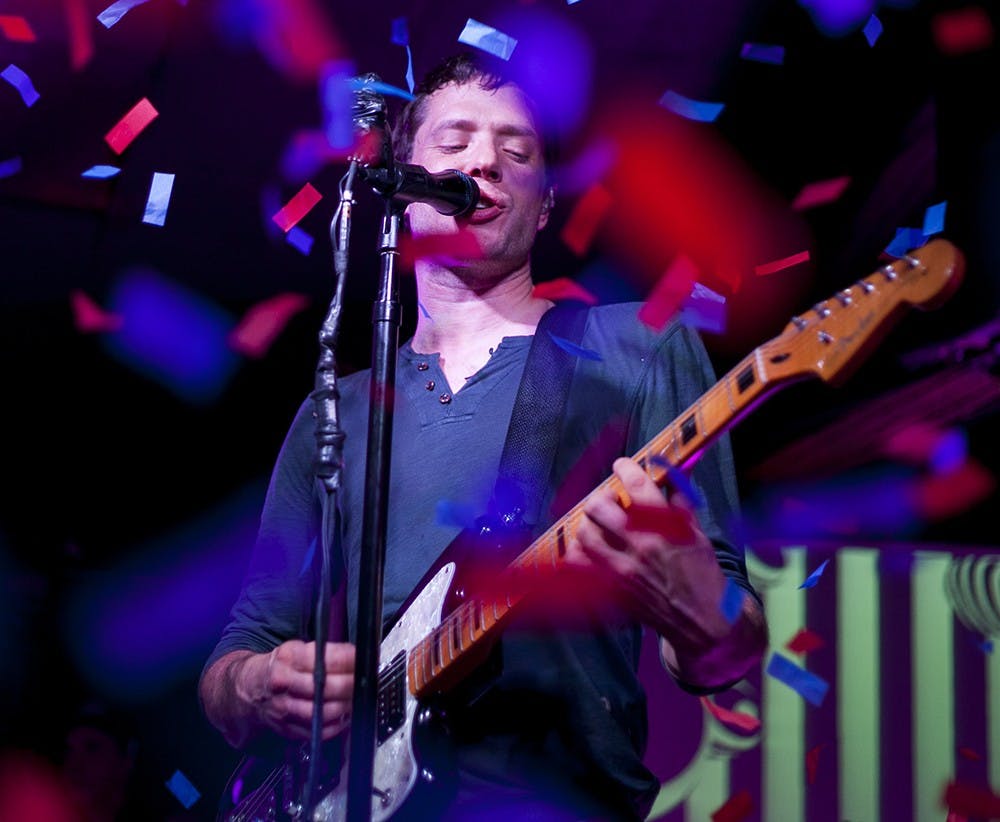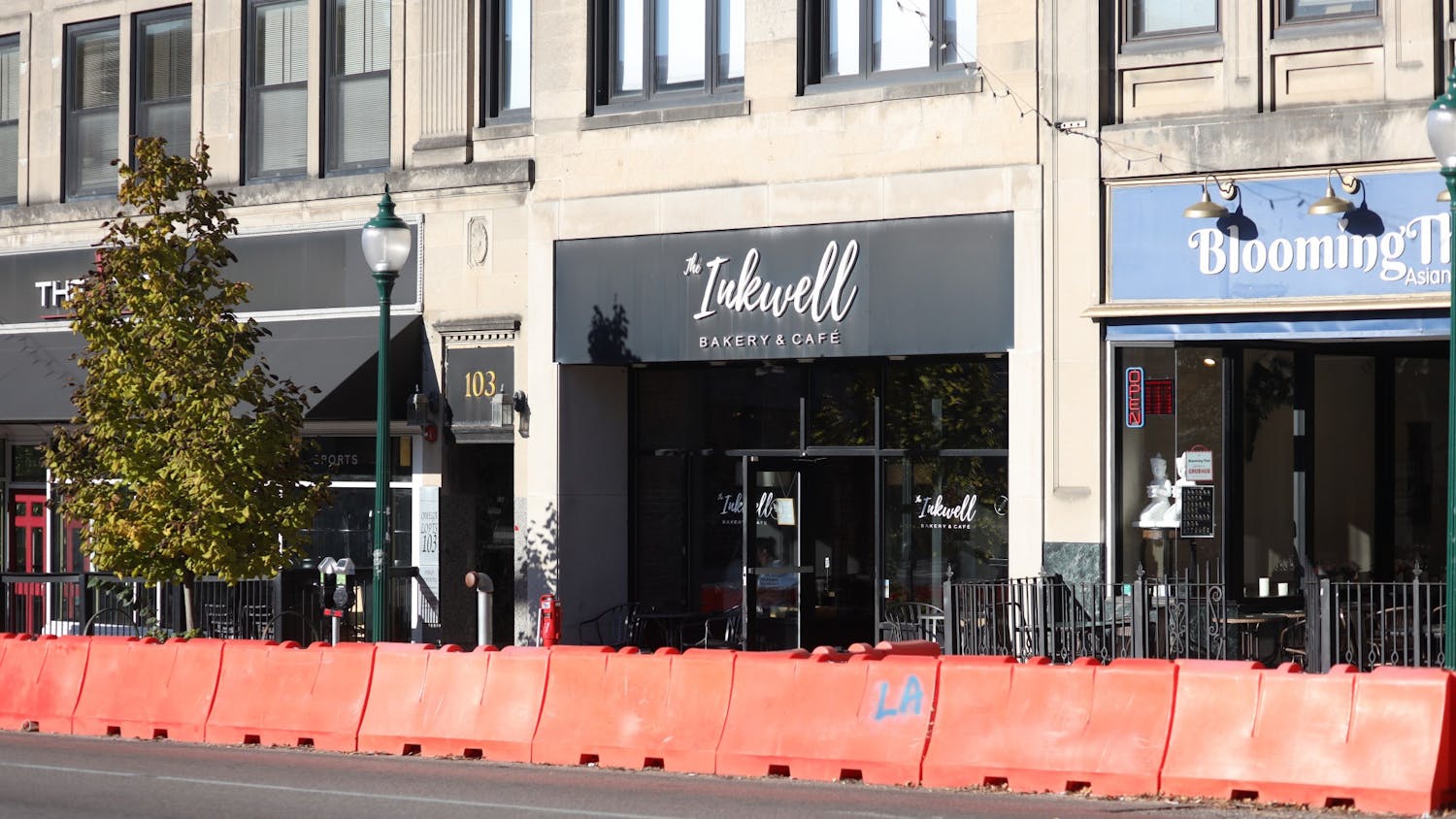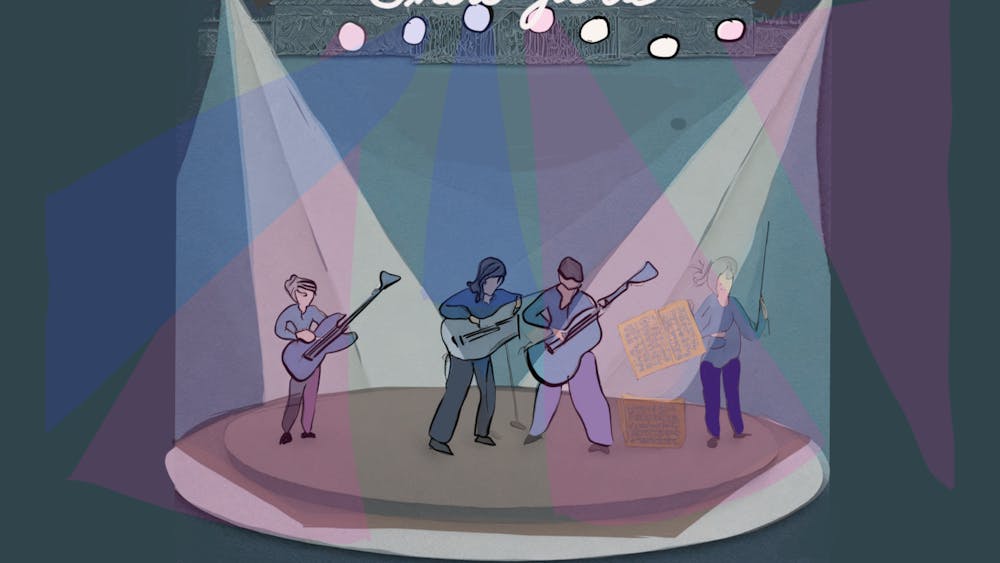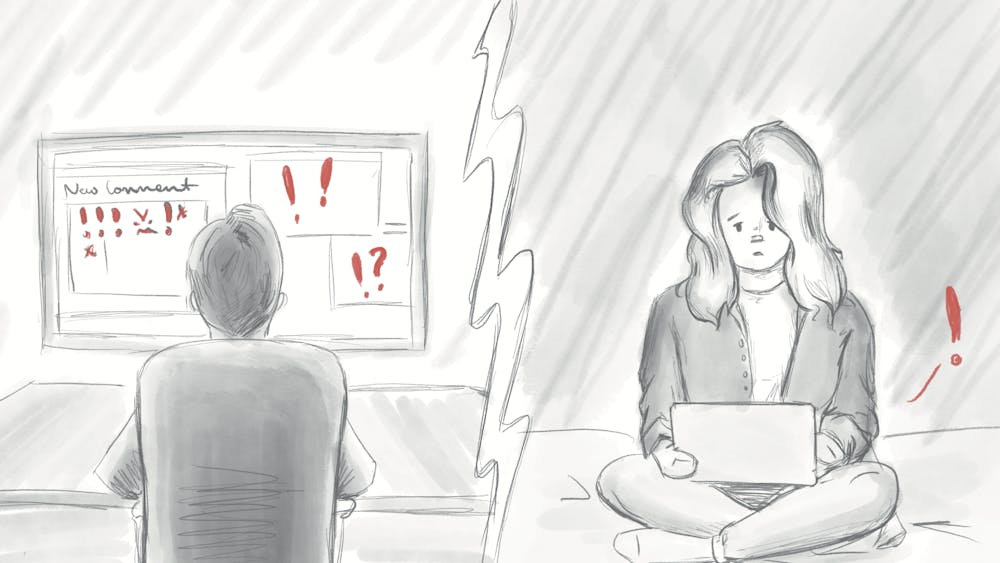With back and forth sways to the DJ’s beat, a mash up of Rihanna’s “Diamonds” and M83’s “Midnight City” plays, the anticipation is set, and the energy is alive.
Soon the lights darkened, and the crowd cheered as they raised one by one on their toes aiming for a higher view. Then, the four emerge.
Damian Kulash, the lead. Tim Nordwind, the bassist. Andy Ross, the guitarist. and Dan Konopka, the drummer. Claps, whistles and hollers fill the ?Bluebird Nightclub’s brick room, lights flash and confetti blows. OK Go is on.
However, the music, the camaraderie and the relationships started between OK Go’s Kulash and Nordwind, as they met at a summer camp when they were 11.
Kulash said that by process of elimination, he became the guitarist because he was the only one that played a string instrument, even if it was the violin.
“I was a terrible violinist, but a worse guitarist,” Kulash said. “I played all six strings at once. I held down one note, so it was the same chord over and over.”
To some, OK Go brings back old memories from childhood, but to others, it’s a new band altogether.
Lisa Locey, 28, came with Thay Pham, 21, for their first viewing of OK Go live.
Pham had been a fan, quoting all of their music videos and his favorite songs, but Locey, who was googling OK Go on her phone, saw the opportunity at the Bluebird and decided to enjoy the night.
“I remember their treadmill video,” Pham said. “The first time I saw it was five months ago, but I loved it, and I can’t wait to see them live.”
OK Go’s treadmill video sparked widespread attention, but it wasn’t the type of label that they were looking to be associated with.
“It’s a careful balance to have goals and things you want to do, but to also remain open enough to things that you never thought of in advance,” Kulash said. “We hit a watershed moment when the treadmill video exploded. We had to decide. We thought, ‘Alright, this is not where we thought we were going.’”
Soon, OK Go became known as the “men on the treadmills.”
“‘Are we going to run from this?’ we thought,” Kulash said. “We wanted to be a rock band. We thought, ‘Should we embrace this and make it part of what we do?’ Instead of trying to out-cool it, we wanted to think of new ways to make videos that would be that much fun and work the same way.”
***
OK Go’s musical background came from several bands they had started separately in high school and college, but none of them were very good, Kulash said.
“Bands, especially in high school or college, are social clubs,” Kulash said. “You play music, but you also hang out and drink. Hopefully chicks will think you’re cool and that sort of thing. It was nice to be with like-minded people who thought this was for fun, but they knew, we’re not here to joke around. We’re gonna play this song 40 times and actually be good at it.”
However, there was never a defining moment in their lives, a drastic shift, from friends playing in a band together to actually thinking of music as a career.
“I don’t know if there was ever a time,” Kulash said. “I never thought this would actually work. When I got out of college, I worked as a graphic designer and a radio engineer, and I figured that I would do those things.”
OK Go started in an old warehouse in Chicago.
“It was a school or a hospital,” Kulash said. “It was a big industrial building that caught fire once a year or so.”
Kulash said they practiced six hours a day for three or four days a week for a year.
“We’ve been on tour for most of the last 15 years,” Kulash said. “That’s the one thing we don’t have to practice anymore. We can play together. If you watch Tim and me on stage, watch our feet. We don’t feel the beat in the same place, but watch our hands, and they’re the exact same way. We’ve played so long together that it’s not conscious. We all play the music the same way, but we feel it differently.”
“We also have the same menstrual cycle,” Nordwind said.
“It’s true,” Kulash said. “Our hearts are beating at the same time.”
The easy-going relationship between Kulash and Nordwind is easy to recognize, on stage and off.
“On stage we’re really friendly towards one other,” Kulash said. “In real life, Tim is not often looked at. We were friends for a long time, but you know, things change.”
“Yeah,” Nordwind said. “We’ve scripted it, so that we’re quite friendly.”
***
As OK Go opens with its song “The Writing’s On the Wall,” the crowd hangs on every beat.
Kulash is no longer playing one chord at a time. His smoky voice fills the room as the thrilling beat pounces throughout and intensifies the energy.
Kulash described the magnetic connection that occurs between the band and the crowd.
“You get this collective emotion that everyone is feeling at the same time,” Kulash said. “Even if you have the loud drunk dude, the spaced out dancer or the mopey goth kid, people who feel in different ways, they all manage to feel the same thing. It’s really hard to describe, but it’s super ?intoxicating.”
Nordwind said they ?design the show to have an emotional arc.
“We start out on a pretty high note, but then we take it down a bit,” he said. Then we will start a song with the audience, go out with them and then end on a high note. It’s nice to go on an emotional journey with the audience.”
“He wants to get the whole crowd on his menstrual cycle,” Kulash said.
“Yeah, but by the end, when we’re on the same menstrual cycle, I know we’ve done something right,” Nordwind said. “It’s a real journey.”






